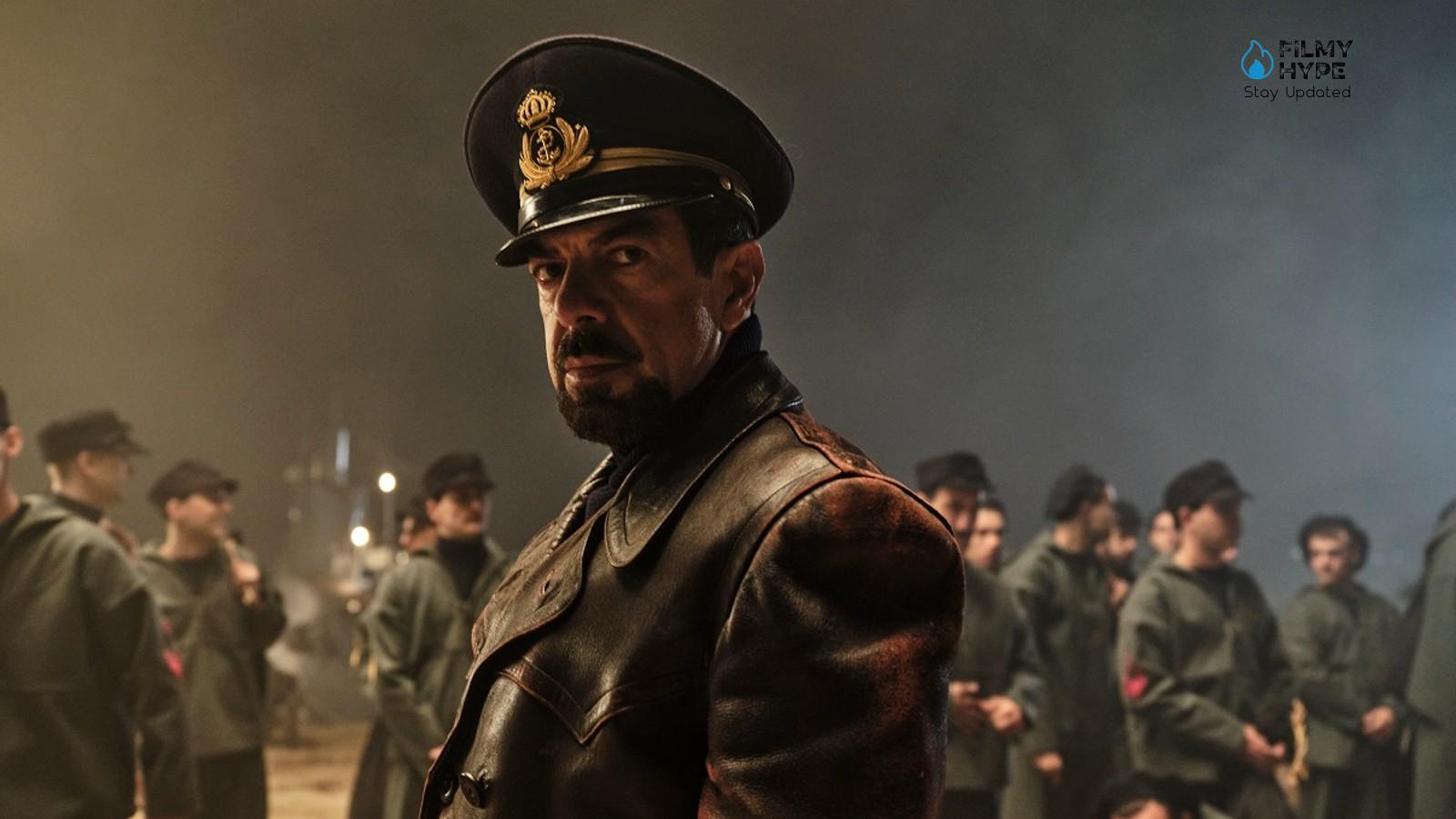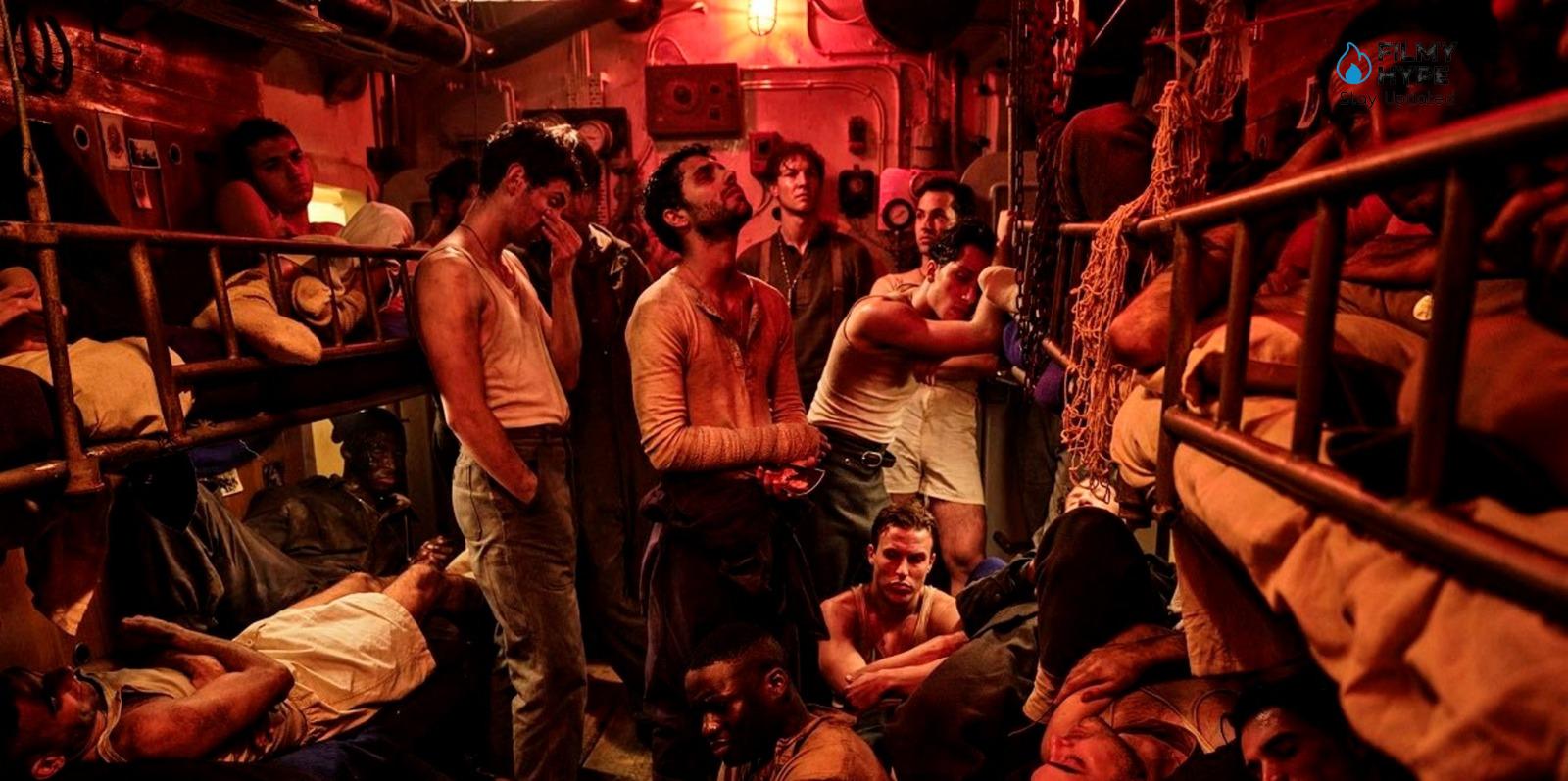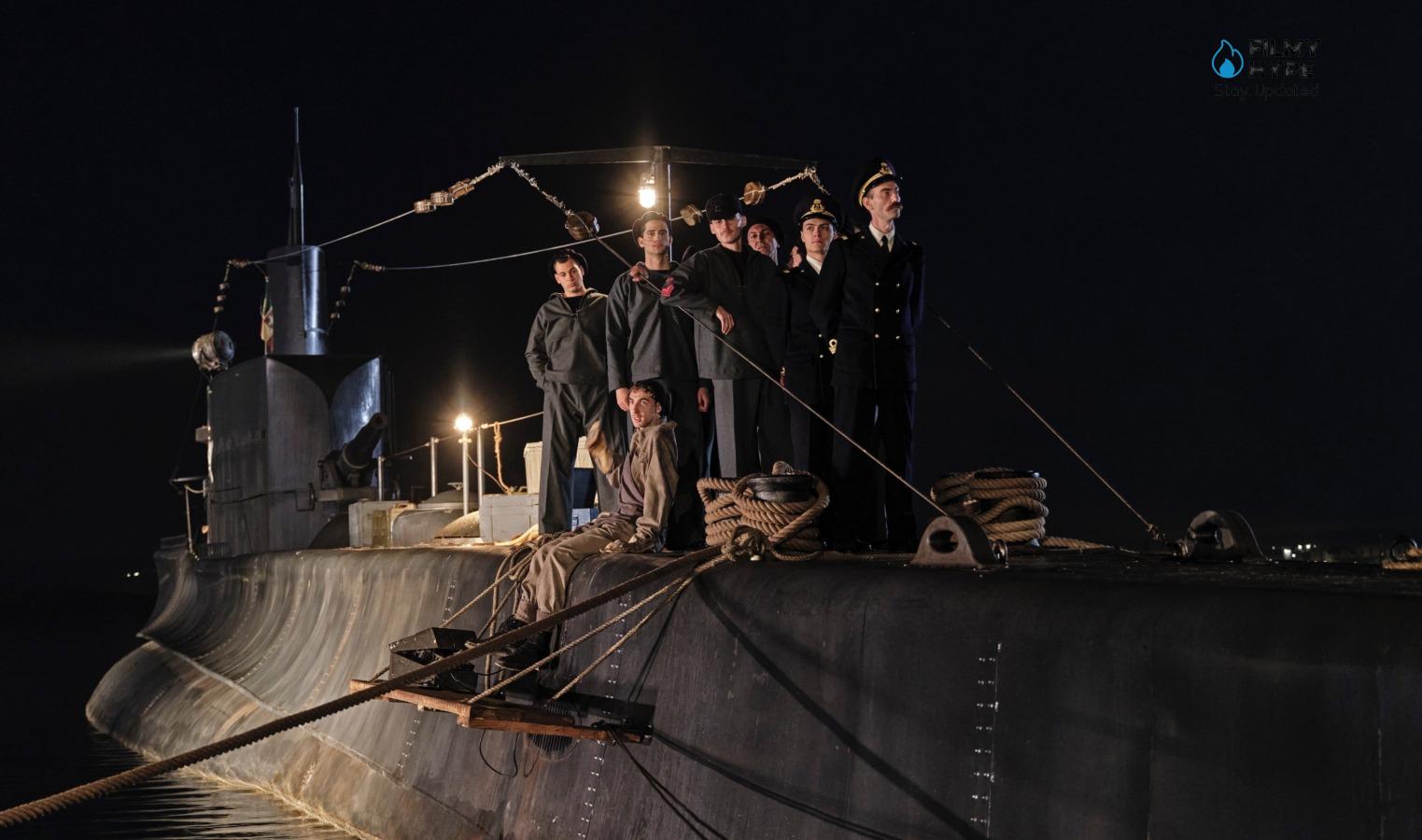Comandante Review Venice 80: Atypical Biopic Strongly Devoted to the Protection of Humanity
Cast: Pierfrancesco Favino, Massimiliano Rossi, Johan Heldenbergh, Arturo Muselli, Giuseppe Brunetti, Gianluca Di Gennaro, Johannes Wirix
Directed By: Edoardo De Angelis
Where We Watched: Venice 80
Filmyhype.com Ratings: 3.5/5 (three and a half stars)
Presented in competition – as well as the opening film – at the 80th edition of the Venice Film Festival, Comandante brings to the screen the true story of the Royal Navy captain Salvatore Todaro (played by an intense Pierfrancesco Favino), a forgotten hero of the Second World War who, in October 1940, rescued the shipwrecked crew of the Belgian merchant ship Kobalo with his submarine Cappellini. As we will see in our review of Comandante, the blockbuster (15-million-euro budget) directed by Edoardo De Angelis and based on the novel of the same name co-written by the Campania director himself and Sandro Veronesi represents a story of humanity within the most inhumane and atrocious context possible, that of war.

The strike of actors and screenwriters that devastated Hollywood seemed to be the political act that, by rebound, ended up characterizing this new Venice Film Festival. Instead, the opening film, Comandante by Edoardo De Angelis, arrives to tell us that political cinema, think of you, we still know how to make; and to take a path – between patriotism and j’accuse – that here, in recent times, no one had attempted in this daring way. Comandante opens Venezia 80 (it will then arrive in theaters on November 1st) in place of the initially planned Challengers by Luca Guadagnino, the tennis triangle starring Zendaya postponed due to the strike. It is the first of six Italian films in competition, for some too many, but perhaps it is a good number to take stock of what we know how to do and tell – if the next ones are like this one, then the balance will be excellent.
Comandante Review Venice 80: The Story Plot
In October 1940, during World War II, the Comandante of the Royal Navy Salvatore Todaro was driving the submarine Cappellini for an ambush mission against the British fleet in the Atlantic Ocean. One night, while navigating on the surface, the silhouette of a Belgian merchant ship looms in the distance – therefore theoretically neutral – with the lights off, which suddenly opens fire on the submarine and the Italian crew. Following a short but fierce cannon battle, the merchant ship sinks, and with it 26 crew members find themselves shipwrecked in the middle of the sea. Thus, Comandante Todaro finds himself making an important and controversial decision: to save the Belgians from certain death at the cost of risking his own life and that of his men.
The film takes us to the beginning of the Second World War, to meet Salvatore Todaro, Comandante of the submarine Cappellini of the Royal Navy. In October 1940, while sailing in the Atlantic, in the darkness of the night Todaro, together with his crew, faced an armed merchant ship traveling with its lights off and caused it to sink with cannon fire. It is at this point that the Comandante makes a decision destined to make history: to save the 26 Belgian castaways condemned to drown in the middle of the ocean and disembark them in the nearest safe port, as required by the law of the sea. To welcome them on board, however, he is forced to sail on the surface for three days, making himself visible to enemy forces and putting his life and that of his men at risk.
Comandante Review Venice 80 and Analysis
De Angelis’ Comandante shows himself to be a true Italian blockbuster. With a production cost of 15 million euros, the director manages to bring and transport the spectator inside the Cappellini submarine, in its narrow and narrow spaces, from the captain’s cabin to the sailors’ bunk beds, from the engine and control rooms to the kitchen that feeds the sailors, up to the cannons that fire and sink the enemy. De Angelis’s direction is sure and decisive, knowing how to juggle between moments of calm and action. It is possible to appreciate the director’s attempt to create a film that is not afraid to make its spectator experience life on board a submarine, not only in moments when fighting against the enemy but also in moments of boredom, routine, and fear. The screenplay work by De Angelis and Veronesi is certainly the least convincing, showing moments of uncertainty and being repetitive, with dialogues that are often inserted only as filler.

Furthermore, the film is flooded with the presence of off-screen voices which, although they carry out the task of guiding and navigating the viewer, are instead monotonous and redundant, as if one were afraid of silence which, yes, I’m coming! is often worth more than a thousand words. It is therefore almost counterproductive that silence is not used wisely and symbolically inside a submarine and tens of meters under the sea. And it is equally clear that the central themes of the film are heroism and Italian pride. It is also easy to understand the highly topical political references of the film, from the relationship with the war in Ukraine to the connection with the dramatic situation of migrants. Yet these themes are only identifiable and never really addressed in the film. What appears very evident instead is patriotism and honor, the pride of being Italian. There are numerous scenes in which the film tries to address the theme of fascism and war more sincerely and honestly, but without ever really succeeding.
A film that knows how to juggle action and moments of quiet, between cannon shots and the cooking of French fries, between the depths of the sea and the surface. A film that works thanks to the acting of the cast – led by a good Favino and a noteworthy supporting ensemble cast, to the extraordinary photography– curated by Ferran Paredes Rubio – and the scenography by Carmine Guarino, which immerses us in the closed and narrow spaces of Cappellini. Exceptional scenography, as revealed by the film’s producers, reproduced the submarine on a 1:1 scale, a real wooden and metal box in which to survive. Also worthy of note are the costumes by Massimo Cantini Parrini, who does an excellent job here, but less interesting instead the music by Robert Del Naja, which wobbles in tones and atmospheres that clash with each other.
But there are also numerous moments in which the film is unable to stay afloat, sinking into moments of monotony and thus creating a fluctuating atmosphere. A film that, beyond helping others and the pride of being Italian, doesn’t seem to address other issues or want to offer critical opinions. Comandante is therefore interesting from a technical point of view but easily loses orientation in the excessive duration. There is the law of war, which requires killing the enemy at all costs and there is the law of the sea, to which Salvatore Todaro appeals in his decision to rescue the shipwrecked people of the Belgian merchant ship. A decision that may seem contradictory: sink the ship but provide aid to the men.
As a man of the sea above all things – a detail he is keen to underline several times throughout the film – Salvatore Todaro di Favino feels the moral obligation to save the shipwrecked, even though he is aware that the enemy would not have shown him the same kindness and risks that such a choice brings with it. But there is also another law that is in force in the heart of the Comandante and it is that of men, a law that applies to everyone beyond their ranks. Indeed, the story told in Comandante is above all a story of humanity within a context, that of war, capable of atrocious and inhuman acts. A lesson in civilization that is still valid today, a story of the past that ends up speaking to the present, and that inevitably leads us to wonder if, even during conflicts, a sort of ethics can find space. The film allows us to imagine that this is possible: someone dares to rescue the castaways and someone to cease fire; in this way, everyone is saved by remembering that they are human. Because true strength lies precisely in the ability to help the weakest.
The most interesting element of the film is certainly that of showing the viewer life inside a submarine, the daily life of a group of young people from different origins and social backgrounds forced into a claustrophobic situation of proximity. The iron belly of the submarine becomes the only possible universe for the boys, but also a sort of refuge from the war raging around them. Here they eat, sing, confide in each other, and try to build a normality – necessary to be able to survive – in which Salvatore Todaro represents a sort of father figure, capable of showing the way forward. It is immediately clear that Salvatore Todaro represents a rather complex character to bring to the stage, especially due to the implications that the role of a soldier in the service of the fascist regime brings with it. It is not easy to isolate the human being and the heroic gesture from such an invasive context, nor to go beyond that slightly exasperated sense of patriotism that emerges in many moments of the film.

Putting all this aside, however, the figure that emerges is that of a man who is not a pacifist but firmly aware of his mission and with well-defined priorities: serving his homeland before his family but respecting the rules of the sea before serving the homeland. Can he be called a hero? It is not easy to answer this question, but one can certainly recognize his merit – if one can speak of merit in war – for having had the courage to make a rather controversial decision to remain faithful to his personal beliefs. Bringing Salvatore Todaro to the screen is an intense Pierfrancesco Favino who, however, often goes beyond his role, emerging in an overbearing way and breaking the boundary between actor and historical character. Although Favino’s interpretation as usual lives up to expectations, it is the dialogues that appear a little too rhetorical, especially in the desire to continue to reiterate his belonging to the Italian flag.
De Angelis is therefore not looking for the claustrophobia or tension that characterizes this kind of film, where normally there is a tendency to exalt all the narrow nature of what can easily become a steel coffin in the depths of the seas. Basically, the spectacular nature of this vessel is not exalted, even though the proposed reconstruction of the submarine is particularly accurate, but rather it is shown while it is on the surface of the water, ready to be a source of help. This does not mean that Comandante is not a film that does not aim for spectacularity, since De Angelis continues to prove himself a skilled packager of images that are as aesthetically beautiful as they are capable of having an emotional impact.
Sometimes, however, the director seems to dwell too much on precisely this type of aspect, delaying the best and most interesting aspects of the story. The entire initial part of the film is an example of this, where the protagonist does appear, but through a series of scenes which, due to oddities in the editing, are confusing. Again, in this first part of the film, moreover, we find a plurality of points of view which, while allowing the creation of particularly evocative images, diverts – even if only for a short time – from Todaro’s gaze, behind which De Angelis would have done better to stay from start to finish. The incipit of the film is therefore not free from defects but fortunately improves when it is necessary to do so, before losing the viewer’s attention.
To prevent this from being lost, however, there is naturally also the interpretation of Pierfrancesco Favino, who, sporting a convincing Venetian accent, puts himself in the military shoes of a man not without contradictions but precisely for this reason fascinating. A man who increasingly develops a strong sense of belonging not only to his country but to the human species, so much so that he decides to “break down the iron but save the man”. Another great interpretation for Favino, therefore, alongside which several young faces of Italian acting (and not only) stand out. However, Todaro’s right arm stands out, played by Massimiliano Rossi in a state of grace.
Comandante Review Venice 80: The Last Words
Comandante represents a history of humanity within the most inhuman and atrocious context possible, that of war. Its protagonist Salvatore Todaro is a complex character brought to the screen by an intense but at times exuberant and rhetorical Pierfrancesco Favino. With Comandante, director Edoardo De Angelis proposes a historical story with strong echoes in our present. A political film that reflects on the need to remain human even in times of war, faithful to the homeland but also to inviolable laws such as those of the sea. An ambitious work, therefore, is not free from defects, but in its distinction from the reference genre manages to find its own identity.







